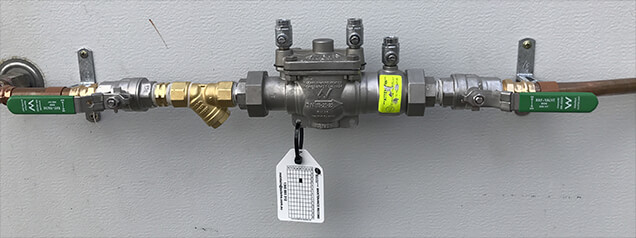 What is backflow testing in Columbus, OH, and why does it matter? Backflows happen when water flows in the wrong direction. Instead of clean water flowing to your home, it flows away, pulling dirty wastewater into the water pipes. Such a change in pressure can result from water leaks or burst pipes. It also happens when there is a break in the municipal water line or large amounts of water are diverted.
What is backflow testing in Columbus, OH, and why does it matter? Backflows happen when water flows in the wrong direction. Instead of clean water flowing to your home, it flows away, pulling dirty wastewater into the water pipes. Such a change in pressure can result from water leaks or burst pipes. It also happens when there is a break in the municipal water line or large amounts of water are diverted.
The plumbing system contains several backflow devices to prevent backflows. These valves prevent water from flowing in the wrong direction and entering the water line. During a backflow test, a plumber checks each device and valve to see if it functions correctly.
If not, backflow repair is necessary. Some states require annual testing of backflow preventers. You may also need testing whenever you make major changes to your plumbing system, like line repairs and new installations.
Backflow is dangerous because it contaminates potable water. The bacteria and chemicals in wastewater can cause serious health issues and illnesses. Backflow testing will ensure your water is clean and free of contaminants.
If you’re worried about ruining your yard to fix the main water line, call us and ask about our trenchless pipe repair.
Backflow Testing In Columbus
It’s important to note that backflow is different from backup. Backups occur when wastes come up through the sinks, toilets, or drains. In a backflow, wastewater mixes with potable water.
Mechanical backflow devices wear out over time and may leak or fail. When this happens, they cannot prevent wastewater from entering your home. These valves are usually installed on the sewer line and can corrode or rust. Changes in water pressure or dirt could also cause a leaky backflow valve.
Some home appliances may also feature a backflow prevention mechanism. These include water conditioners, softeners, washing machines, toilets, irrigation systems, and any appliance that connects to the water supply. Your plumber can also check these fixtures to ensure they are adequately protected.
Problems in water pressure are a common cause of backflows. The main water line requires pressure to deliver water to your home. If something is stronger than that pressure, it could enter the water line. This shift can also happen when the pressure in the supply line drops, creating a vacuum. Wastewater is then sucked into the pipe.
A broken sewer line can also cause backflow. If you suspect any problem in your water flow, immediately call a plumber. Backflows are not only detrimental to your health, but they can also damage the plumbing system.
Any of the following issues could signal the need for backflow repair:
- Reduced water flow
- Bad tasting or smelly water
- Discolored water
- Slow drains
- Leaky backflow device
Frequently Asked Questions about Backflow Prevention
Whether you’re new to backflow problems or it’s something you dread, we hope to help you by answering these frequently asked questions.
What Is a Backflow System?
A backflow system prevents contaminated water from flowing back into your home after a loss of water pressure or other problem in the system.
What Is Backflow Testing?
Backflow testing services give you peace of mind by testing your water to ensure that no contaminated water has seeped into your supply.
What Causes Loss of System Pressure?
You can experience a loss of water pressure for various reasons, including pump failures, system maintenance, line breaks, and fire hydrant usage. This loss of pressure can cause siphoning, which is when water siphons back into your house, contaminating your drinking water.
Do I Need Backflow Testing?
If you own a commercial property such as an apartment, your State Health Department may require backflow testing to ensure your residents, workers, or customers’ safety. However, even the average homeowner can benefit from this service.
If you have additional questions about backflow testing services, contact us for a consultation.
How a Backwater Valve Works
Backwater valves, or backflow valves as they’re sometimes called, are valves installed on the sewer line that allows water to flow in only one direction — out of your house. If you experience sudden, heavy rainfall or a water main break, the sewers can become overwhelmed, which causes sewage to back up into your home. Having a backwater valve prevents contaminated sewer water from getting into your drinking water.
Inside a backwater valve is a small flap that is open, allowing water to flow out of your home and into the sewer system. A small flotation device sits on each side of the clap, and if water or sewage flows back into the house, the floaters cause the trap to close, preventing contaminated water from getting in. If you don’t have a backwater valve installed, or if it has been improperly installed, sewage could come into your basement via drains, sinks, toilets, or bathtubs.
You can rely on Apex Pros Plumbing, Electric, Heating and Air for expert sewer line repair.
Reliable Backflow Repair
 You never know when a backflow can occur. Although municipal water lines have backflow preventers, anything can happen. Get your plumbing system tested before disaster strikes.
You never know when a backflow can occur. Although municipal water lines have backflow preventers, anything can happen. Get your plumbing system tested before disaster strikes.
Because this concerns the well-being of your family, you need a plumber whom you can trust. Apex Pros Plumbing, Electric, Heating and Air provides backflow services at affordable prices. We are here to ensure your water is clean and safe to use. Our plumbers are trained and licensed and will take care of any backflow problem you may have. Our backflow repair services will ensure your home’s plumbing system is in top condition.
Here at Apex Pros Plumbing, Electric, Heating and Air, we are proud to offer 5-star services to all our customers. Our 100 percent satisfaction guarantee ensures you get the services you need when you need them. Our friendly plumbers will be happy to help.
If you are concerned about your drinking water, call Apex Pros Plumbing, Electric, Heating and Air for professional backflow testing and repair in Columbus.






